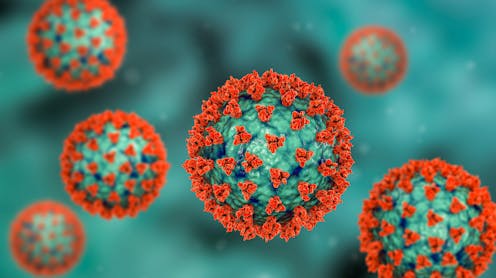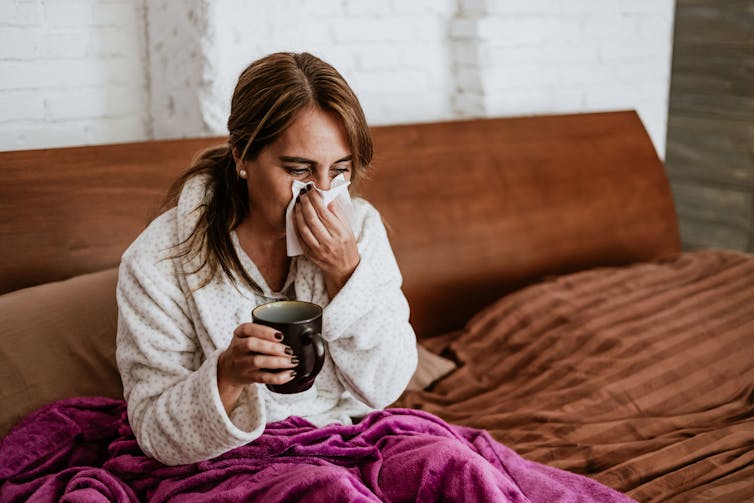
One aspect of the COVID pandemic that has fascinated both scientists and the public alike is how the infection affects people differently.
I’ve previously discussed the potential reasons some people have managed to avoid infection completely. But for those who have been infected, symptoms can range from a mild cold-like illness, to something resembling a flu, to severe respiratory distress and even death.
At the other end of this spectrum are the people who don’t experience any symptoms at all. We refer to this complete absence of disease as “asymptomatic infection”. About one in five people are thought to be asymptomatic with COVID.
While we know older people and those with underlying medical conditions are at higher risk of severe COVID, it’s less clear what makes people more likely to have minimal or no symptoms. But a new study published in science journal Nature suggests a particular gene mutation could help explain why some people are asymptomatic.
Human leukocyte antigens (HLAs) are a group of genes that play a key role in our defence against infectious diseases. These genes encode proteins that allow our immune system to recognise what’s part of our own bodies, as opposed to what is an invading pathogen the immune system should attack.
Within our cells we carry two copies of each gene – one from each parent. These copies can be different from each other, and one, or both, may have certain mutations. Different forms of the same gene are known as alleles.
Differences in our HLA genes (HLA alleles) are common and have previously been linked to how susceptible people are to particular viral infections. For example, certain HLA alleles are associated with quicker clearance of the hepatitis B virus, while other HLA alleles appear to result in slower progression of disease in HIV patients.
The Nature paper has identified an HLA allele, known as HLA-B* 15:01, that could shed light on why some people don’t get symptoms when they’re infected with SARS-CoV-2 (the virus that causes COVID).
Read more: Haven't had COVID yet? It could be more than just luck
What the study did
Researchers recruited 29,947 people from the National Marrow Donor Program in the US. Bone marrow donors are “HLA-typed” so they can be matched with patients who have similar HLA genes. This reduces the risk of post-transplant complications.
Using a mobile app, participants were asked to record if they tested positive for COVID and if they were experiencing any symptoms. This was during the early stages of the pandemic, before vaccines were widely available and when many people were regularly testing for the virus.
Of the 1,428 participants who tested positive for COVID between February 2020 and April 2021, 136 remained asymptomatic. HLA-B* 15:01 was more than twice as common in people who didn’t have symptoms. People with two copies of this allele were over eight times more likely to be asymptomatic.

T cells are a subset of white blood cells that protect us against viral infection. To confirm their hypothesis, the researchers took T cells from donors that carried the HLA-B* 15:01 allele but had never been exposed to SARS-CoV-2 (these samples were taken before the pandemic).
They found these T cells reacted to part of the SARS-CoV-2 virus that was very similar to parts of the common cold coronaviruses. This could mean that people with this HLA allele that had previously had a common coronavirus infection had “cross-reactive” immunity to SARS-CoV-2.
If the immune system can recognise part of the SARS-CoV-2 virus, this would mean an immune response could be launched much faster and the virus could be destroyed before symptoms develop.
Some unanswered questions
This study still leaves us with unanswered questions. HLA-B* 15:01 was present in 20% of people with no symptoms. So, what prevented the other 80% of asymptomatic people from getting sick? What’s more, 9% of people with symptoms had the HLA allele. Why did this not protect them from symptomatic illness?
Participants in this study began reporting COVID test results and symptoms very early in the pandemic. The list of symptoms we associate with SARS-CoV-2 infection has changed over the past few years, partly due to different variants and increased immunity from vaccination and prior infection. So it would be important to find out if the findings still hold true using data from later in the pandemic.
It’s also possible there were differences in how people interpreted any possible symptoms, or lack thereof.
Due to sample numbers, this research focused only on white participants. HLA-B* 15:01 occurs in about 10% of people with European ancestry, but the frequency of HLA alleles can vary in different populations. It would be important to confirm the correlation of this HLA allele with asymptomatic COVID in other racial and ethnic groups.
Read more: Do genetic differences make some people more susceptible to COVID-19?
This isn’t the first time HLA genes have been linked to COVID outcomes. Another HLA allele has been associated with the production of more antibodies and a lower risk of breakthrough infection following vaccination.
While it isn’t a surprise that HLA genes may affect disease severity, there are probably many different factors involved in determining the symptoms we experience, if any. The more information we have on how our immune systems respond to viral infection, the better placed scientists will be to develop new and improved treatments and vaccines.
Lindsay Broadbent has received funding from The Wellcome Trust.
This article was originally published on The Conversation. Read the original article.







